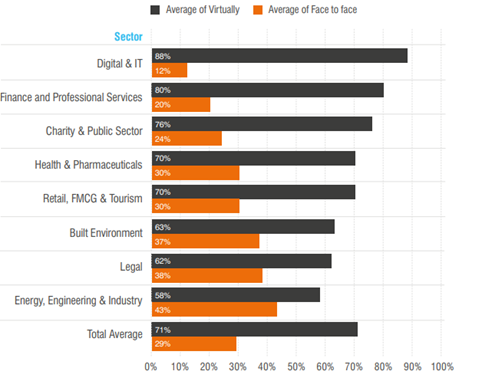Skills development for early career hires has changed now that we’re transitioning into the post-pandemic workplace, explains Nicola Thomas, head of research at ISE.
The Covid-19 pandemic is responsible for one of the most rapid changes to the workplace since the introduction of the internet. As a result, many organisations have undergone rapid digital transformation and changed to hybrid or fully remote working.
To ensure employees can successfully navigate this new world of work, organisations need to ensure that they’re developing their workforce with the right skills needed for the post pandemic workplace.
This year’s ISE Student Development survey helps us to understand how employers are adapting their approaches to graduate and apprentice skills development in the aftermath of the Covid-19 pandemic.
Focusing on the ‘right’ skills
There seems to be high consensus among employers of what skills are important to develop in graduates, with a strong focus on enhancing their commercial skills.
When it comes to graduate development, 98% of organisations focus on developing their commercial awareness, self-awareness and job specific technical skills and 97% of employers also focus on developing graduate presentation skills.
There also seems to be a clear consensus about the different skills that employers focus on for their graduate hires as opposed to school and college leavers.
Looking at development programmes for school and college leavers, employers reported focusing much more on person-centered skills.
The top reported skills employers developed for their school and college leavers were business-appropriate communication, self-awareness, confidence and time management. These skills suggest that employers are more focused on skills that will help these hires to integrate more successfully into a business environment.
When looking at what skills employers were least focused on developing, we also see a big difference between graduates and school leavers.
Employers are least likely to focus on developing data handling and analysis, writing and creativity in their graduates. The majority of the time these skills can be considered an integral part of completing a university degree, with an assumption by most employers that their graduates already possess a high proficiency in these skills at the time of starting their new role.
However, the World Economic forum rates creativity as the 5th most important skill to have in 2025 and considers it crucial for business leaders. Organisations need to make sure they regularly review their development strategies to ensure they’re tooling their early career hires with the right skills needed in the future.
For school leavers, employers rated ‘managing up’ as one of the skills they were least focused on developing. This makes sense in the context of employers focusing on the development of person-centered skills for school and college leavers over commercial skills.
However, organisations need to manage the risk of not ending up predetermining their early career hires’ professional outcomes based on academic background rather than their work performance, ability, and personal aspirations.
Employers have changed their approach to skills development
One of the biggest changes we see in early careers development for 2022 is the increase in one to one tutoring.
One to one tutoring was rated as the most popular skills development approach for early career hires in our latest survey, compared to last year when online learning was rated as the most common.
By increasing the focus on individuals within your development programme you can ensure that you’re tailoring your development activities to the areas where your early career hires need the most support.
In the survey rotation between business functions was rated as one of the most impactful activities for skills development. However, despite this, only 60% of employers applied this approach when developing graduates, and only 63% used this approach for school and college leavers.
The access to other teams and business units has been much more available with the move to hybrid working and it would make sense for organisations to take advantage of this opportunity to introduce job rotation into their development programmes.
Our Student Development survey also showed that there has been a massive reduction in the engagement early career hires have with senior leadership. Only 28% of organisations reported using this approach in 2022, compared to 87% in 2021.
Employers reported that this was a result of moving to virtual working and early career professionals spending less time in the office and therefore having less touch points with the senior leadership team.
Virtual onboarding is here to stay.
The majority of employers reported that they’re still using using virtual onboarding as their main delivery method. Employers reported that 71% of induction was still delivered digitally in 2022 with only 29% being done face to face.
There were some variations to this depending on the sector, the Digital and IT sector had the highest instance of virtual inductions with 88% of their onboarding virtual. While other sectors such as the Energy, Engineering and Industry sector, where work is more centered around manufacturing based tasks, the instances of virtual onboarding was much lower with only 58% of their induction digital.

Overall our Student Development survey reported a significant decrease in the number of induction programmes solely delivered face to face. We found that in 2022 only 21% of inductions were completely face to face, compared to 46% in 2021.
However, interestingly, we’ve also seen a reduction in the number of fully virtual programmes, with only 37% of employers reporting that they’re running fully virtual programmes in 2022 compared to 62% in 2021. This highlights the move towards hybrid working as the primary choice for the majority of employers post Covid-19.
The future of skills development
It’s safe to say that hybrid working is here to stay. Employers need to ensure that they’re developing their early career hires with the skills needed for succeeding in the split workplace.
Today’s graduates have had less opportunity to engage with the job market before entering it than any previous cohorts, due to the limited availability of work placements and internships during Covid-19.
Organisations need to ensure that they’re increasing their support for these early career professionals so that they successfully settle into the workforce.
By focusing their development approaches on one to one tutoring and mentoring, organisations will be able to better offer support to their early career hires, as well as, more personalised skill development. This can have a positive effect on job satisfaction, reducing risk of staff turnover.
This should be a key consideration to any organsisation in what is currently a strong candidate driven market, with many employees choosing to move on to new roles for the prospect of a bigger paycheck and better career progression.
Read more insights and data on ISE research


0 Comments